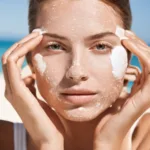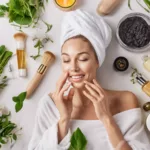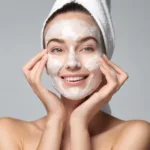17 January 2024
Social media’s impact on teen skincare education and the potential risks of following influencer recommendations
In the age of social media, teenagers have unprecedented access to skincare education. Platforms like YouTube and TikTok offer a wealth of information and tips on achieving flawless skin. However, much of this “education” is influenced by skincare influencers whose primary objective is to promote products. This raises concerns about whether young girls, in particular, are using the right skincare products. The recent trend of teens and tweens using expensive adult skincare products, largely influenced by social media, has sparked debate among dermatologists. This article examines the potential risks and offers expert advice on how to approach skincare for young skin.
The Double-Edged Sword of Social Media
Social media platforms provide a wealth of skincare knowledge, but they can also introduce insecurities and unrealistic expectations. Teens, who are more critical of their skin, often aspire to achieve the flawless complexions they see on their screens. However, many of these images and videos are altered or filtered, leading to unrealistic standards. Dr. Brooke Jeffy, a board-certified dermatologist, warns that teens should be cautious about the content they consume and seek the opinion of a dermatologist to avoid falling for false information.
Understanding Teenage Skin
Teen skin differs significantly from adult skin, primarily due to hormonal changes. Hormonal shifts during puberty lead to oilier skin and increased acne breakouts. Additionally, adult skin is generally more damaged from sun exposure, pollution, and inflammation. Skincare products formulated for adults often target concerns like fine lines, wrinkles, and hyperpigmentation. However, younger skin is also thinner and more sensitive, making it more prone to irritation and breakouts when exposed to certain active ingredients.
Tailoring Skincare for Teens
Teenagers require a different approach to skincare than adults. Dermatologists recommend a “protect and preserve” routine for teens, focusing on gentle cleansing, moisturizing, and sun protection. A pH-balanced cleanser, a moisturizer with humectants, emollients, and occlusives, and a mineral-based SPF 30+ sunscreen are essential. It’s also crucial to avoid common skin irritants like fragrances, alcohol, and menthol. Teens should seek products that are free of preservatives like parabens, formaldehyde, and propylene glycol, especially if they have sensitive skin or eczema.
The Pitfalls of Product Overload
While teens may be tempted to try multiple products and follow elaborate skincare routines, less is often more for younger skin. Dermatologists caution against using too many products, as it can lead to skin irritation and make it difficult to identify which ingredients are causing problems. It’s recommended to introduce new products one at a time and test them for at least two weeks before adding anything else. This approach allows for a better understanding of how the skin reacts and avoids overwhelming the skin’s natural protective barrier.
The Dangers of Active Ingredients
Teenagers should exercise caution when using active ingredients like retinoids, AHAs, and BHAs. While these ingredients can be beneficial for adult skin, they can cause significant irritation and inflammation in younger, more sensitive skin. Dermatologists stress the importance of seeking guidance from a professional when incorporating these ingredients into a skincare routine. Over-the-counter retinols, in particular, can lead to severe dermatitis and skin thickening if used without supervision.
Treating Acne with Care
Acne is a common concern among teenagers, but it should be treated delicately. Working with a dermatologist is ideal for determining the best acne-fighting ingredients for an individual’s skin. If professional guidance is not available, it’s important to start with one acne-targeting product and give it time to work before adding more. Chemical exfoliants like AHAs and BHAs should be used sparingly to avoid overexfoliating the skin. Physical exfoliators, such as scrubs, can cause microscopic tears in the skin barrier and should be avoided.
The Importance of Sunscreen
Sunscreen is a vital part of any skincare routine, especially for teenagers. Despite investing in multiple products, many teens neglect to use sunscreen regularly. Failure to protect the skin from the sun’s UV rays can lead to premature aging, wrinkles, age spots, and even skin cancer. Dermatologists emphasize the importance of incorporating sunscreen into the daily routine and recommend using a mineral-based SPF 30+ sunscreen.
Conclusion:
While social media has revolutionized skincare education for teenagers, it’s crucial to approach skincare recommendations with caution. Influencers may not always provide accurate information, and their product endorsements may not be suitable for young skin. Teenagers should focus on a “protect and preserve” approach, using gentle cleansers, moisturizers, and sunscreen. Consulting a dermatologist is highly recommended to ensure the right skincare products are used and to address any specific concerns. By adopting a thoughtful and tailored skincare routine, teens can achieve healthy and radiant skin without falling prey to marketing noise and unrealistic expectations.



